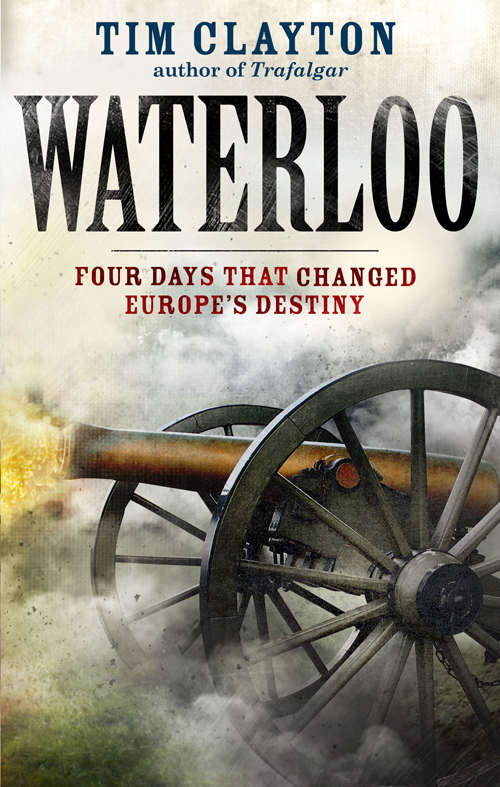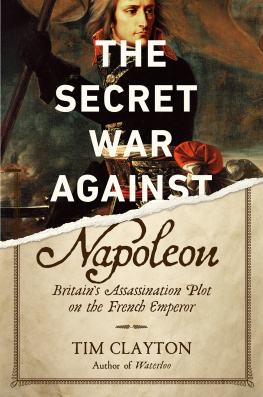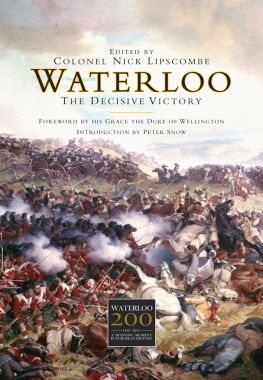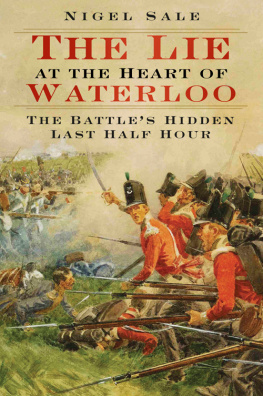Tim Clayton - Waterloo : a new history of the battle
Here you can read online Tim Clayton - Waterloo : a new history of the battle full text of the book (entire story) in english for free. Download pdf and epub, get meaning, cover and reviews about this ebook. year: 2014, genre: History. Description of the work, (preface) as well as reviews are available. Best literature library LitArk.com created for fans of good reading and offers a wide selection of genres:
Romance novel
Science fiction
Adventure
Detective
Science
History
Home and family
Prose
Art
Politics
Computer
Non-fiction
Religion
Business
Children
Humor
Choose a favorite category and find really read worthwhile books. Enjoy immersion in the world of imagination, feel the emotions of the characters or learn something new for yourself, make an fascinating discovery.

- Book:Waterloo : a new history of the battle
- Author:
- Genre:
- Year:2014
- Rating:4 / 5
- Favourites:Add to favourites
- Your mark:
- 80
- 1
- 2
- 3
- 4
- 5
Waterloo : a new history of the battle: summary, description and annotation
We offer to read an annotation, description, summary or preface (depends on what the author of the book "Waterloo : a new history of the battle" wrote himself). If you haven't found the necessary information about the book — write in the comments, we will try to find it.
Tim Clayton: author's other books
Who wrote Waterloo : a new history of the battle? Find out the surname, the name of the author of the book and a list of all author's works by series.
Waterloo : a new history of the battle — read online for free the complete book (whole text) full work
Below is the text of the book, divided by pages. System saving the place of the last page read, allows you to conveniently read the book "Waterloo : a new history of the battle" online for free, without having to search again every time where you left off. Put a bookmark, and you can go to the page where you finished reading at any time.
Font size:
Interval:
Bookmark:

Sea Wolves: The Extraordinary Story of Britains WW2 Submarines
Tars: The Men Who Made Britannia Rule the Waves
Trafalgar: The Men, the Battle, the Storm (with Phil Craig)
Finest Hour (with Phil Craig)
Diana: Story of a Princess (with Phil Craig)
End of the Beginning (with Phil Craig)
Published by Little, Brown
ISBN: 978-0-7481-3412-0
Copyright Tim Clayton 2014
The moral right of the author has been asserted.
The right of Tim Clayton to be identified as the author of this work has been asserted by him in accordance with the Copyright, Designs and Patents Act 1988.
Maps drawn by John Gilkes
All rights reserved. No part of this publication may be reproduced, stored in a retrieval system, or transmitted, in any form or by any means, without the prior permission in writing of the publisher.
The publisher is not responsible for websites (or their content) that are not owned by the publisher.
Little, Brown
Little, Brown Book Group
100 Victoria Embankment
London, EC4Y 0DY
www.littlebrown.co.uk
www.hachette.co.uk
To James and John
in memory of happy
evenings at Worcester
.
.
.
Nothing in ancient or modern history equals the effect of the victory of Waterloo, proclaimed The Times a week after the news broke, and it was not long before it became clear that the intense four days of fighting that culminated in the battle of Waterloo had put an end to twenty-two years of warfare. Soon people began to be variously confident or fearful that the career of the phenomenal Napoleon Bonaparte was really over, and with it an age on which he had stamped his extraordinary personality; that revolutions were a thing of the past. Aristocracy ruled in Britain, the French king was restored to his palace and other hereditary monarchs could sleep soundly on their thrones once again. These had indeed been momentous days.
As the world realised that Waterloo had been an exceptionally hard-fought battle with exceptional consequences, in which the greatest army in the world had been utterly routed, the prestige of the little British army led by the Duke of Wellington rose to unprecedented heights. On behalf of a grateful nation that had already accumulated a debt of 850 million through its efforts to defeat the French Emperor, Parliament voted the Duke 200,000 for a mansion to add to the 500,000 that he had already been given to support a place in the hereditary aristocracy, and his status as destroyer of Napoleon gave him the last word on all matters military. All those lesser mortals who had survived the bloodbath near Brussels basked in the glory of having been a Waterloo Man. Waterloo, the Poet Laureate Robert Southey soon declared, was the greatest victory in British history, and the battle continues to enjoy that status to this day.
Victory rewarded the dogged determination of Wellington and the Prussians to act in unison, despite Napoleons best efforts to drive them apart. At the heart of this successful Anglo-Prussian axis were three very different men: Wellington aged forty-six, an austere loner, efficient, socially ambitious; Blcher a hard-living, hard-drinking seventy-two-year-old cavalier, so loved by his troops that it was said they would follow him into the mouth of hell; and Gneisenau, Blchers brain, who organised, planned and restrained his chief, reputedly republican and ill at ease among the Prussian and British aristocrats. They were facing an old enemy, the devil unchained, Napoleon Bonaparte, who had returned from the exile imposed upon him after his defeat in 1814: genius, upstart, moderniser, liberator, tyrant, enigma, the man widely considered to be the best general since Alexander the Great.
This amazing story demanded publication and the Duke of Wellington received the first enquiry from a would-be historian within weeks of the event. The object which you propose to yourself is very difficult of attainment, and, if really attained, is not a little invidious, he replied in August 1815. The history of a battle is not unlike the history of a ball. Some individuals may recollect all the little events of which the great result is the battle won or lost; but no individual can recollect the order in which, or the exact moment at which, they occurred, which makes all the difference as to their value and importance. This simile, curiously evocative of the Duchess of Richmonds ball, danced on the night before the first battles, was remarkably apt. More than most campaigns, Waterloo was a jumble of things done in a desperate hurry, without time for food, sleep or much in the way of official recording, and even so soon after the events it was difficult to recall exactly what had happened when.
Wellingtons second objection to a history was that it would inevitably expose those who did not perform well, since the faults or the misbehaviour of some gave occasion for the distinction of others, and perhaps were the cause of material losses; and you cannot write a true history of a battle without including the faults and misbehaviour of a part at least of those engaged. Here, too, he had a point: at that time the honour of regiments and nations was sacred and individuals were forgiven most lapses in the wider interest. Individual participants are now long dead, but regiments and even nations have proved lastingly tender of their honour and insistent on having the story told their way, to the detriment of objective truth.
Despite Wellingtons misgivings, at least seven histories were published in 1815 and another nine the following year. The Duke did not think much of them. To a correspondent he replied testily:
The people of England may be entitled to a detailed and accurate account of the battle of Waterloo, and I have no objection to their having it; but I do object to their being misinformed and misled by these novels called Relations, Impartial Accounts, &c. &c., of that transaction, containing the stories which curious travellers have picked up from peasants, private soldiers, individual officers, &c. &c., and have published to the world as the truth.
To another historian who wondered to what sources, if all accounts were unreliable, he might safely resort, Wellington wrote, You now desire that I should point out to you where you could receive information on this event, on the truth of which you could rely. In answer to this desire I can refer you only to my despatches published in the London Gazette. Later, he amplified this view of the duty of the battle historian, who was
to seek with diligence for the most authentic details of the subject on which he writes, to peruse with care and attention all that has been published; to prefer that which has been officially recorded and published by public responsible authorities; next, to attend to that which proceeds from Official Authority, although not contemporaneously published, and to pay least attention to the statements of Private Individuals, whether communicated in writing or verbally, particularly the latter, if at a period distant from the date of the operation itself; and, above all, such statements as relate to the conduct of the Individual himself communicating or making the statement.
Once again this was sound advice and, had his own accounts only been a bit more complete, honest and reliable, historians might have followed it. Unfortunately, Wellingtons own dispatch was written in a hurry when he was very tired: it was a fair enough account of the battle that Wellington had seen but there was much that he had not seen. The glory that he bestowed on the Foot Guards and the heavy cavalry put them at the centre of most subsequent British accounts to an extent that was not really justified. Moreover, he said little that was positive about his allied contingents, and although he paid warm tribute to the Prussians, his claim to have won the battle with his final charge before they made their breakthrough succeeded in belittling the significance of their contribution in the eyes of the average Briton.
Font size:
Interval:
Bookmark:
Similar books «Waterloo : a new history of the battle»
Look at similar books to Waterloo : a new history of the battle. We have selected literature similar in name and meaning in the hope of providing readers with more options to find new, interesting, not yet read works.
Discussion, reviews of the book Waterloo : a new history of the battle and just readers' own opinions. Leave your comments, write what you think about the work, its meaning or the main characters. Specify what exactly you liked and what you didn't like, and why you think so.







